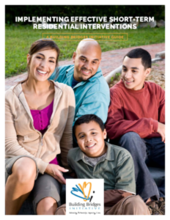EXECUTIVE SUMMARY
If you think residential intervention cannot change - think again. Innovative leaders are rethinking and redefining what residential intervention is and where it is delivered. By studying the research and implementing new methods, exemplary providers are improving the outcomes for youth and families. Cutting-edge effective residential intervention now means providers are creatively working with youth and families in the home, in the community, and as briefly as possible – often for three months or less (Blau, Caldwell & Lieberman, 2014).
But making the leap to short-term flexible residential intervention without acknowledging the historical context, developing a framework for change, or the ability to access resources could make wary providers feel like they are jumping off a business cliff without a net. Recognizing this challenge and the pressure residential leaders face with fewer referrals and regulators and funders demanding accountability for effective services and durable outcomes, the Building Bridges Initiative developed this Implementation Guide. It is intended to be a ‘virtual safety net’ and a resource to start this change process. The Guide provides the rationale for change, a pragmatic framework to create change, and specific examples of organizations and their leaders that are already walking the walk and available to talk. In other words, residential providers who want to improve their service and outcomes do not have to go it alone and provider-experts are available to help.
This Guide is grounded in evidence-based practice (EBP) and practice-based evidence that reflects the wisdom and inspiration of more than 20 exemplary leaders who are transforming their services to enhance their effectiveness and their bottom line. Each leading provider agency identifies specific strategies which are organized into “7 Essential Elements of Short-Term Residential Intervention” that are encapsulated with brief “action snapshots” followed by more detailed “common tasks” and specific examples from provider-experts:
- Effective leadership
- Family and youth engagement and inclusion
- Workforce development
- Practice strategies and tools
- Using data to inform practice
- Quality improvement
- Fiscal strategies
The provider-expert approaches align with the Six Core Strategies©, an EBP and organizational change framework, which provides a template for managing the process. To further support the shift to short-term service delivery — fiscal, policy, and administrative recommendations and resources are also offered.
Ultimately, the goal of this Guide is to help you recognize the emerging best practices in residential intervention.

